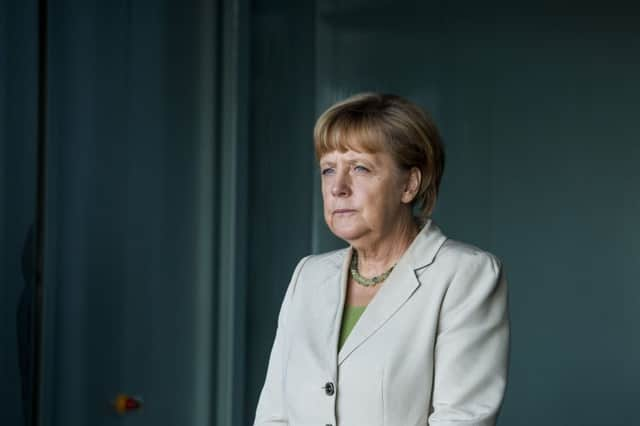How EU countries view Britain's triggering of Article 50


Tusk, the former Prime Minister of Poland who was born when the country was a de-facto Communist state, knows better than most the positive impact of the EU.
He told a press conference that the road ahead would be difficult, as the UK commences the two-year negotiation window.
Advertisement
Hide AdAdvertisement
Hide AdTusk is responsible for speaking on behalf of the 27 remaining countries in the EU, but in truth they don’t always speak as one.
There are a number of different blocs even within the 27 countries who the UK will say farewell to no later than March 29th 2019.
We take a look at just some of these countries views and demands ahead of the UK’s formal departure.
Germany
Germany is the biggest economy in Europe, the EU, and the Eurozone.
Membership of these three bodies means that there is little economic change that Germany can undertake that doesn’t have an affect on its neighbours.
Angela Merkel, so loathed of anti-globalist politicians like Nigel Farage and Donald Trump, has proven herself a shrewd negotiator dealing with all manner of issues.
Germany has said that it will take a tough line on the British approach to the single market, with warnings Theresa May couldn’t have her cake and eat it.
Already, a massive blow has been dealt by Angela Merkel to the Brexit strategy that Theresa May outlined in her speech to parliament today.
Advertisement
Hide AdAdvertisement
Hide AdThe UK Government had sought to have parallel discussions on leaving the bloc while negotiating a future trade deal with the remaining nations.
Prime Minister May’s letter to Donald Tusk said four separate times that her Government desired that parallel approach.
The ink was barely dry on that letter before Angela Merkel said that the EU countries would not allow Britain to conduct talks on a future relationship before the ‘exit’ talks are completed.
France
The political situation in France is currently as febrile as that of the UK in June 2016, or even Scotland in 2014.
President Francois Hollande is not standing for re-election after a disastrous few years politically mired by a struggling economy and a series of compromises.
Marine Le Pen, a populist politician in the mould of Donald Trump, is currently expected to make the two-way run off to win the Presidency.
Centrist politician Emmanuel Macron is on record as saying that Britain can’t expect a special deal regarding access to the European Single Market once it leaves the EU.
Le Pen, for her own campaign, has said that she is in opposition to the approach taken by EU leaders so far, and said that the rest of the countries want to punish the UK.
Advertisement
Hide AdAdvertisement
Hide AdWith Marine Le Pen and Emmanuel Macron neck-and-neck in some polls, it remains to be seen which one will be the driving force behind negotiations by a country that is the third biggest in Europe.
Ireland
Ireland might not be the biggest or the most influential EU state, in political or economic terms, but for Britain Ireland’s views are of key importance.
Remarkably little priority seems to have been given in the UK Government about the ongoing political crisis in Northern Ireland.
The fragile peace process is bound up in the European Union, and the unintended consequences of Brexit in Northern Ireland were hardly discussed in the lead up to the referendum last June.
Among other issues, the DUP’s backing of Brexit has led to the collapse of the power-sharing Executive in Belfast.
Theresa May has repeatedly said that there can be no return to a ‘hard border’ between the Irish Republic and Northern Ireland.
This is a view which is shared unilaterally by those in the North, even those who want to see a united Ireland keep all the residents of the island in the European Union.
That approach is currently incompatible with the rules governing member states of the EU, and would need a special opt-out for that particular border.
Advertisement
Hide AdAdvertisement
Hide AdIt is hard to understate the negative impact that a hard border and all it entails returning to Northern Ireland would have on the country.
Ireland, a close ally of the UK, even after Brexit, has worked as closely as any country with the Government, but has been clear that Theresa May must be willing to pay the so-called ‘Brexit Bill’ – the money it will cost the UK to extricate itself from the EU.
Other countries
Away from the main players, the other countries have reacted with a number of different priorities, chiefly protecting their own interests.
Spain’s Prime Minister Mariano Rajoy expressed his sadness that Britain had triggered Article 50, and with a fragile economy, wants the shock to investors in Europe to be as small as possible.
Joseph Muscat, the Malta premier, agreed after meeting Rajoy, saying he didn’t want EU citizens in Britain or UK citizens abroad to be used as pawns in any negotiations.
Italy is currently recovering from its own referendum, which, like the Brexit vote, claimed the country’s Prime Minister.
Greece remains the basket case economy of Europe, with passions continuing to run high in the country over the difficult conditions inflicted on the country by Eurozone ministers.
With a group as broad as the EU, there are certain to be all manner of other reactions, demands, and negotiating tactics that the UK will have to deal with.
That, as much as anything, will make the job of Theresa May and the UK Government all the more difficult as Article 50 marks the start, not the end, of a long process.
